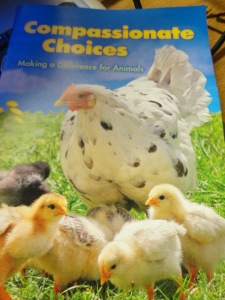Cruelty-Free Eating?
Today on my college campus, just like every day it seems, there were some random people passing out random pieces of paper that will soon end up in a trash can.

Many of the people who spend their days giving information to people who are less than interested possess radical beliefs about controversial issues. The paper they distribute is usually an advertisement (these are the more “normal” people), or propaganda supporting their cause. Today, I got the latter – a booklet about veganism and factory farms. I would love to just brush this off, laugh at it, maybe even publish a parody version about the mistreatment of plants. However, the spread of misinformation is an ever-present problem for agriculture, and this example is no different.
I don’t doubt that some people who operate animal harvesting facilities do so inhumanely. I don’t doubt that some animals live their lives in dismal conditions – food animals or not.
However, the challenge is how reliable and timely this information is. I don’t know anything about when this booklet was published or what methods were used to acquire the photos, but I do know that other similar materials have been known to use and reuse photos and video from one example – as in, you’re seeing the same video of the same cow from 1998(ish) nearly every time a news source comes up with a scare about mad cow disease.

The booklet raises other questions, as well. Obviously, the funding for the handout came from vegan sources, and not from animal farms. A photo has been floating around Facebook in the past couple of weeks, which makes an interesting point (check out the photo to the right). I agree with one of my Facebook acquaintances who made this comment, “[This photo is] aimed at those people (most of whom have never even visited a farm/have no animal science education/consider all animals to be pets) who tend to “tell” ranchers and farmers that the way that they do things is wrong and inhumane when said ranchers and farmers have spent years and generations working with their animals and caring for them 24/7 (many even studying for years in college on animal behavior and psychology).”

This quote (left) from the booklet caught my attention as well. Although I certainly don’t agree with the manner in which this idea was presented, I must admit that I’ve wondered some of the same things. Is it possible that people in the agriculture industry are too often on the defensive, trying to prove that no one should be telling them what to do, when consumers are demanding something completely different? Perhaps we should be thinking about how to be transparent and welcoming instead of defensive and proud. I’m not sure what an ideal balance between transparency and the right of citizens to operate businesses with limited oversight – I just know that something needs to be done.

One of the last things included in the booklet, after a long description of how veganism works, was this phrase: Cruelty-Free Eating. I think that people have varying definitions of cruelty, but in general would be alright with “cruelty-free” just about anything. In fact, many farm families choose to buy their meat and other products from local sources because they know more about how the products are made, cared for, harvested, etc.
This booklet offers veganism as the only alternative to buying from “factory farms.” While much progress has been made regarding conditions in large farms (which, coincidentally, are just as likely to be family-0wned as many other farms), it is possible to reduce your support of practices that you are uncomfortable with, without giving up meat and animal byproducts altogether. You can research the companies you are giving your grocery-store purchase dollars to, and decide how you feel about them. If any of them give you a bad impression, you can choose to buy from a local meat processing business, ranch, or other farm with whose practices you are comfortable.
Maybe our best bet is to open our doors, take some photos, and produce a booklet much like this one – only with factual content and unedited photos. Perhaps if we let our voices be heard, someone will listen.
Farm Out Loud!
Posted on May 8, 2012, in Ag Issues, Agvocacy, MSU and tagged agriculture, agvocacy, animal cruelty, eat, factory farm, farm, food, harvest, misinformation, organic, vegan. Bookmark the permalink. Leave a comment.
Leave a comment
Comments 0